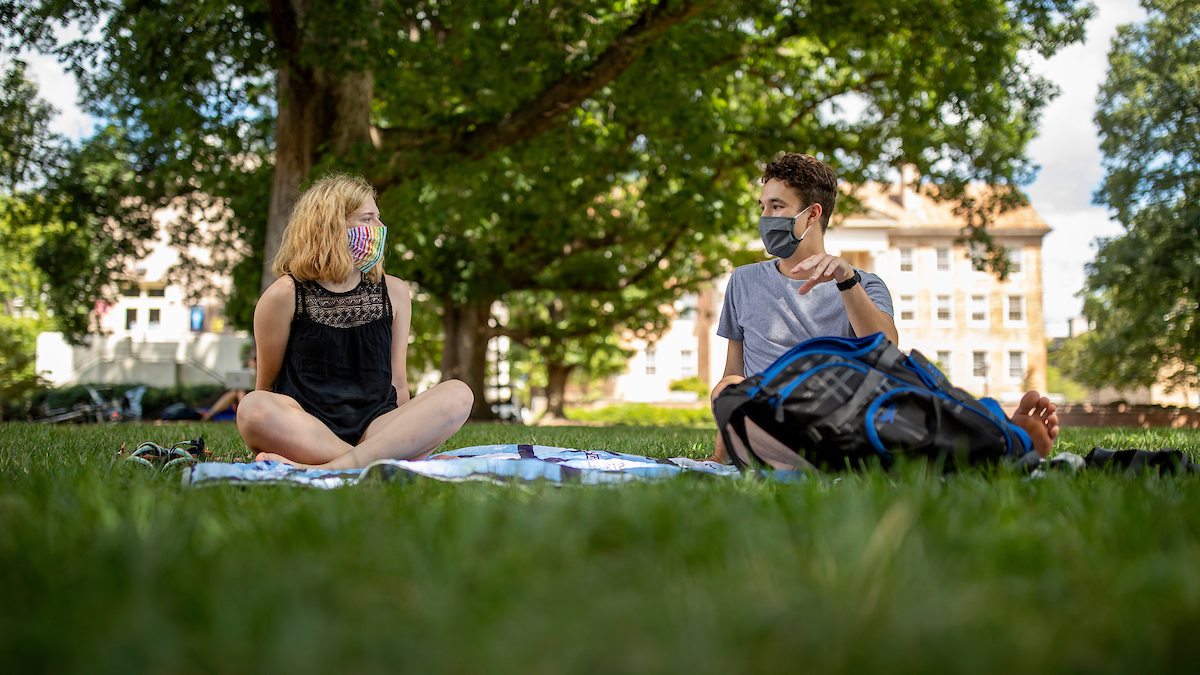How to make friends during a pandemic
Making new friends can be a challenge even under normal circumstances. Add in a pandemic that forces us to remain physically distant, and it can feel overwhelming. Mitch Prinstein explains how it's still possible to build those relationships even when everything feels so different.

For many students, college is an opportunity to grow more fully into themselves or even create a new identity for who they’ll be the rest of their lives.
That process entails the occasionally tricky task of building a new social network from the ground up in an entirely new environment.
“The social relationships we have in college are incredibly formative for establishing who you will become. Peers play an incredibly important role in shaping what we do in college, what we believe, and how we spend our time,” said Mitch Prinstein, Carolina’s John Van Seters Professor of Psychology and Neuroscience and an expert on adolescent peer relationships.
 Not only are those friendships important for social development, but they’re also necessary for your physical health. An absence of social relationships actually triggers similar responses in our brains as physical pain.
Not only are those friendships important for social development, but they’re also necessary for your physical health. An absence of social relationships actually triggers similar responses in our brains as physical pain.
“Social relationships aren’t just for fun or entertainment. They are very important,” Prinstein said. “We are biologically programmed to need them, to seek them, and our bodies respond dramatically when we don’t have them.”
But making new friends can be a challenge even under normal circumstances. Add in a pandemic that forces us to remain physically distant, and it can feel overwhelming.
Prinstein shares how it’s still possible to build those relationships even now when everything feels so different.
Create opportunities for one-on-one conversations.
At the start of a new school year, students normally travel in large packs and socialize in groups. Over time, those groups dwindle as people begin pairing off and make closer connections.
That’s our natural instinct of essentially shopping around for friends, Prinstein said. But physically distancing removes that opportunity. Instead, he suggested trying new activities and seeking out opportunities to have safe one-on-one conversations with a lot of different people.
“Now, you have to [meet] in really small groups because it’s not safe to hang out with everybody in your dorm,” Prinstein said. “It takes more effort and work to try and do that one at a time with people.”
When you have the opportunity to talk with a new person, focus on them and ask questions to find common ground. To an extent, Prinstein said, it’s a speed-dating mentality of seeking out as many small conversations as possible and maximizing the information you gain.
Those conversations just may need to virtual right now.
Use technology, but dig deeper.
A great starting point is technology. Through apps like GroupMe or online gaming platforms, you can begin creating connections with people and having shared positive experiences.
“It’s not just information exchanged through an interview. You have to actually have fun together,” Prinstein said. “When you both share the same moment of fun, that creates the bonding.”
This only goes so far, he warned. You’re likely only scratching the top layer of a person’s very curated surface and only building superficial connections, not substantial ones that can grow into friendships.
The key, Prinstein said, is using those initial virtual connections to learn more about the real person. The direct messages should turn into phone calls and then into video chats to create more opportunities to really get to know a person even when you can’t necessarily be together in-person.
“You’re connecting based on the information they’re choosing to provide to you,” he said. “Everyone knows that’s not the real person behind the profile, however. It’s a curated version of who they are. It is hard to form the real connections because in real life, we hang out with people, we see them do awkward and stupid things and we get to know them warts and all.”
Lean into the awkwardness.
You might be thinking that all of that sounds uncomfortable. It is.
Everything we’ve known about making friends up until this point is different. Even the basics of in-person conversations have changed. When we’re wearing masks for safety, we’re also covering our facial expressions.
It’s something we can overcome by saying things like “that’s funny” instead of smiling, but it can feel forced and awkward. Those adjustments will help build connections with people, Prinstein said.
“We have to describe how we’re reacting to what people are saying verbally because we can’t rely on people seeing us smile or engage in subtle facial expressions to read one another,” he said. “We’ve experienced our entire lives without having to do that, so it’s genuinely awkward. We have to lean into it.”
That awkwardness you feel shouldn’t prevent you from making new friends. For your physical and mental health, it simply can’t.
“Our friends are the number one source we go to when we’re experiencing stress, and we’re experiencing a huge amount of stress right now,” Prinstein said. “Put yourself out there and find a way to recognize that this is a human need. Finding a way to make new friends is totally worth it even if it feels awkward to make new connections in unfamiliar or forced ways.
“We just all need to lean into the awkwardness and just be like ‘Look, I know this is uncool and weird, but I’m in college and want to make new friends.’ It’s going to be a little bit peculiar, so let’s just laugh about it and have a good sense of humor about the odd world we live in now.”




